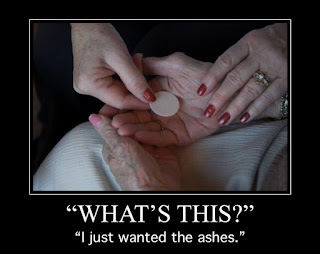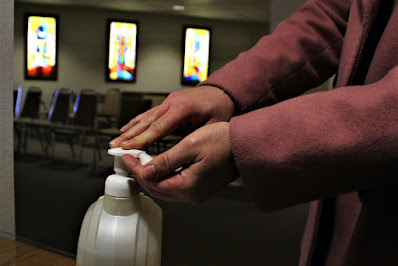The kids and I watched Creed II the other night. It was good. As anyone from Philly knows, Rocky Balboa, the underdog boxer-with-heart from Kensington, faced off against fighter Apollo Creed in Rocky I and II. In the Creed series of movies, Rocky trains Apollo's son Adonis after Apollo is killed in the ring. The back story in Creed II is that the boxer that killed him, the Russian Ivan Drago, is training his son Viktor to face off against Adonis.
Adonis is a good fighter with a good life--he's recently engaged to his sweetheart with a baby on the way, lives in a nice house, and is the reigning WBC heavyweight champion. Viktor, on the other hand, is an absolute animal. Scenes of him training in Kiev show how hungry he is to dominate, how focused, and how savage.
One scene that stayed with me was when Rocky was counseling Adonis not to go back in the ring with him after he is brutally beaten and sent to the hospital by Drago (who was disqualified from the match). "Listen to me," he tells Adonis, "you got everything to lose. He's got nothing to lose. When a fighter ain't got nothing to lose, he's dangerous."
When Creed gets out of the hospital and starts physical therapy, he's unnerved and not in the right headspace. Boxing is as much a mental sport as it is physical, and his doubts, fear, and lack of drive are a liability. Still, he knows he has to take the fight with Viktor to defend the title. The best thing Rocky did was realize this and travels with Adonis to the desert (symbolic) to train for an undetermined amount of time with convicts and other outcasts with "nothing to lose" in order to break and rebuild him.
As a disciple of Jesus Christ, Rocky's warning to Adonis about Viktor chaffs me spirit: He's got nothing to lose...and you have everything to lose. Now that I am married with kids, comfortably employed, a homeowner, etc., I realize I am in Adonis' shoes: I've got everything to lose.
And what have I really given up to follow the Lord Christ? Is it more that I fit the Lord's calling into my existing life? Sure, bloom where you're planted and all that. Set roots, be an active member of your parish. And yet, there is no disputing how comfortable and insulated I am, not only materially, but spiritually.
No one knew more about the snares of comfort than St. Francis of Assisi. a young man hungry for the Lord. He referred to money as "dung" and equated it with the Devil himself. He held nothing in possession, so that he had nothing to lose...and everything to gain from the storehouse of Heaven.
St. Francis was bold as well. When he approached the Muslim leader of Palestine, Muhammad Al-Kamil, he had no thought of his own life but only the conversion of the Sultan and securing of peace. In the minds of people who play it safe, it was a certain death sentence. But St. Francis was hungry for souls. He trained in poverty and self-denial to a radical degree. His life was unorthodox. And yet he was one of the greatest saints in the Church.
As a married man, I am not called to live the life of a religious. But that doesn't excuse me from the call to forfeit my life in order to gain it, to hold nothing back, to listen and respond right away without hesitation. The Lord knows that only those who sell everything in order to buy the Pearl of great price deserve it. Ananias and Sapphira held back some of their earnings and lying about it and were struck dead (Acts 5:4), while St. Francis' life was spared. But even if he was killed by the Muslims, he would have welcomed his fate.
We can see two portraits of King David: the ruddy, fearless boy who steps up to the Philistine and defies him to his face, and the comfortable King in middle-age strolling around the palace when he should have been with his men at war. The fearless shepherd boy seeking to give glory to Israel gains the head of the giant; the same man in later years as a king with everything would inevitably fall into grave sin by pursuing his carnal desires.
I'm risk averse by nature. I invest conservatively, and am careful when I drive, watch my health, etc., and even more so as I've gotten older. After all, I have people depending on me being here. I do my best to work within my state of life to live out my calling, but if I am honest there is a lot I don't do and am not open to or will even consider, rationalizing it as "God wouldn't want me to that" of "I can't leave my job" or "someone else will do it." My "training" in the life of faith is in a pampered, familiar gym.
I wasn't always this way. I didn't give a second thought to hitchhiking to Mexico City just to pay homage to Our Lady of Guadalupe in my twenties. Or living in a drug-infested gang neighborhood to serve the poor because the Lord said to in the bible. Or taking off my $200 Italian leather hiking boots to give to a barefoot homeless man on the streets of Philadelphia because I had shoes and he didn't. What happened to me? Somewhere along the line, I gained some prudence, but like Adonis Creed, I lost the hunger, and am no longer dangerous to the Enemy.
We need to take risks for the Lord as an exercise in faith in order to win the crown. The tighter we hold to the things we have and own, the less apt we are to do just that. Only an empty hand can accept a gift. And a fighter who is hungry enough will eventually unseat the one who isn't.












.jpg)
